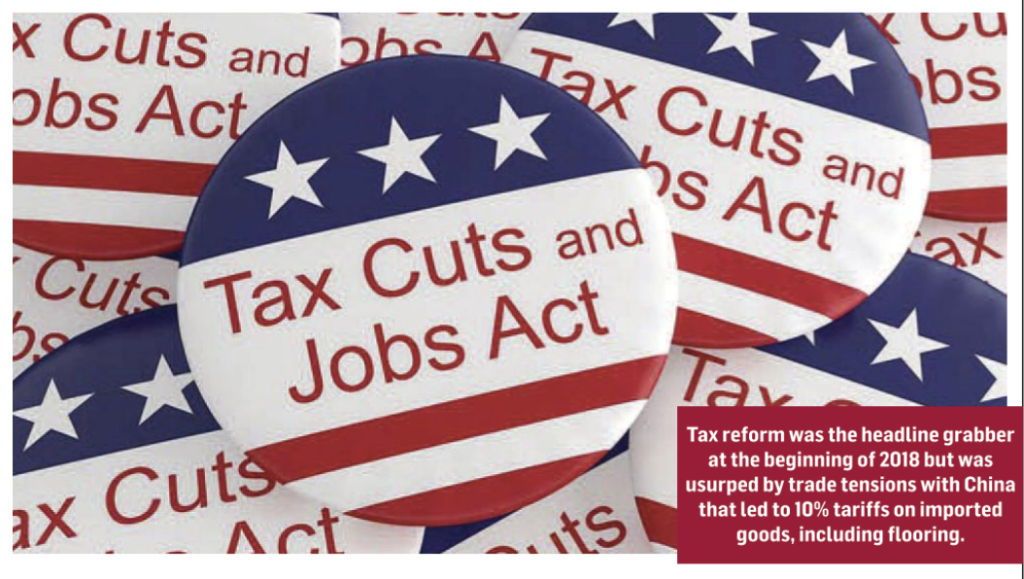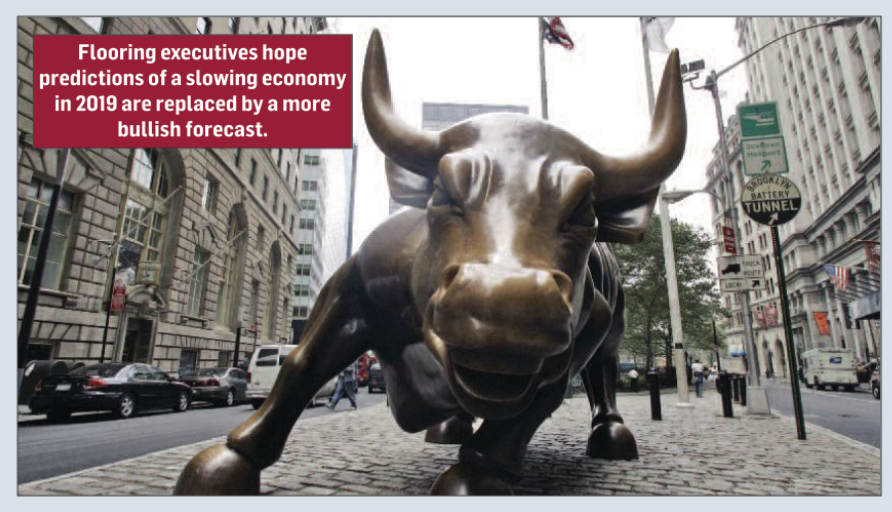January 21/28, 2019: Volume 34, Issue 17
By Ken Ryan
 Last year began with Congress passing the largest piece of tax reform legislation in more than three decades, a law intended to lower the tax burden on businesses and create more jobs. The year ended with concern about a trade war and tariffs on Chinese imports, and a volatile stock market that turned in its worst December since the Great Depression.
Last year began with Congress passing the largest piece of tax reform legislation in more than three decades, a law intended to lower the tax burden on businesses and create more jobs. The year ended with concern about a trade war and tariffs on Chinese imports, and a volatile stock market that turned in its worst December since the Great Depression.
In the end, 2018 was a good year for the flooring industry, perhaps the best since the recession ended, according to some retailers. How much credit tax reform had to do with that, leading flooring executives say, is open for debate. “I don’t think the 2018 tax reforms had a big impact on my business,” said Chris Kemp, owner of Kemp’s Dalton West Flooring in Newnan, Ga. “I do think the general state of our economy had a positive impact on our business. I’m sure tax reform had some unrealized positive effects to the general state of our economy.”
Other executives are taking a wait-and-see approach regarding any effects tax reform may have had on business. “The reality is we are not yet certain of the long-term impact of this administration’s economic policies,” said Scott Humphrey, CEO of the World Floor Covering Association (WFCA). “I don’t think anyone can deny the tax cuts at least had a short-term impact on building consumer confidence, but that is only sustainable if other policies—including job creation and trade—create a long-term foundation for future growth. We all know the job market is likely the best it has been in our lifetimes.”
Interestingly, observers say the low unemployment rates have hurt some elements of the flooring industry. For one, it has made it more difficult to address the installation crisis as the pool of potential candidates is greatly reduced. But the overall sentiment is a bountiful workforce is a good thing. “The fact that more people are working certainly allows for more discretionary income that can be used for renovation of current dwellings and business establishments, so that should be seen as a factor positively impacting our industry,” Humphrey told FCNews.
TariffsWhile tax reform began the year as the biggest story impacting the flooring industry, the trade war with China and subsequent tariffs stole the headlines. “Tariffs have definitely had an impact on the hardwood segment,” said Michael Martin, CEO of the National Wood Flooring Association (NWFA). “Reports from lumber exporters indicate sales have been declining since the initial tariffs were imposed. Although an additional 25% tariff was postponed, the uncertainty has left many producers in the wood segment unsure about how or when the administration will act, and how additional tariffs may impact their businesses. Right now, it’s a wait-and-see mentality, which cannot be sustained without impacting business.”
WFCA’s Humphrey said most Americans prefer free trade and agree it is not fair that tariffs are put on imported U.S. goods with no reciprocity on products brought into the U.S. “The challenge is that a norm has been established and attempting to buck that norm is painful. It is likely the U.S. and China will come to an agreement in the first quarter of 2019. It won’t be everything the U.S. and President Trump want, but will likely be better than our current situation.”
The 10% tariffs and threat for bigger penalties initially led to more emphasis on reshoring, with foreign companies seeking to set up shop in the U.S. and domestic companies leveraging their Made-in-the-USA claims. But even that trend seems to have waned, according to some observers. “Reshoring read well in the headlines as it was an early emphasis of this administration, but it has lost a bit of its luster as more companies are once again looking to inexpensive labor as a way to greater profitability,” Humphrey said.
Consensus: Slower growth expected for 2019
 The encouraging economic news for 2019 is the odds are still against the U.S. economy entering a recession. The sobering news, according to many economists, is growth is expected to be slower, not only in the U.S. but globally as well.
The encouraging economic news for 2019 is the odds are still against the U.S. economy entering a recession. The sobering news, according to many economists, is growth is expected to be slower, not only in the U.S. but globally as well.
In a signal of a softening economy, the Federal Reserve lowered its growth forecast for 2019 from 2.5% to 2.3%, and indicated it would only implement two interest rate hikes, down from its earlier plan of three increases. “Our forecast is we’ll still have solid growth, declining unemployment and a healthy economy,” Fed chair Jerome Powell said. However, Powell acknowledged there is a “fairly high degree of uncertainty” about where the economy and rates are going.
The housing market, a bellwether for the flooring industry, has been slowing with building permits and new construction trending lower. Case in point: Toll Brothers, a large luxury home builder, saw new home orders plunge the most since 2011. “In November, we saw the market soften further, which we attribute to the cumulative impact of rising interest rates and the effect on buyer sentiment of well-publicized reports of a housing slowdown,” said Douglas Yearley, Toll Brothers CEO.
Some flooring executives said they have seen some softening in the first quarter so far. “Our residential sales track fairly closely with changes in the stock market, so the recent declines definitely point to slower residential growth over the very near term,” said Torrey Jaeckle, vice president of Madison, Wis.-based Jaeckle Distributors. “Consumer sentiment has been in slower growth mode for about one year now and could be tracking negative soon. Neither of these indicators bodes well for the very near term at the macro level.”
Retailers are somewhat mixed in their view of 2019. Eric Mondragon, hard surface buyer for R.C. Willey Home Furnishings, Salt Lake City, said the fourth quarter slowed down more than expected due to the tariffs, albeit the retailer still ended Q4 up 7%. “That would usually carry over to the new year,” he said. “However, we started off 2019 with a new Congress and the government shutdown still in effect, which has an effect on consumer confidence and has slowed down store traffic.”
Olga Robertson, president of FCA Network, took a different stance. She said as long as consumers can separate what’s happening on Wall Street from Main Street—and consumer confidence remains positive—retail will continue to flourish. “There’s still liquidity and money to lend by the major central banks, which includes the Fed. A 30-year mortgage is still under 5%, which is good news for all of us in the housing industry.”
